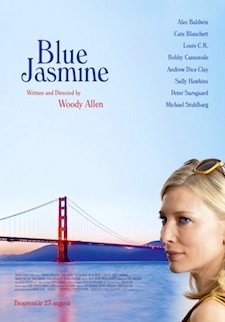|
Blue Jasmine, directed by Woody Allen (Sony Pictures, 2013) When I came out of Blue Jasmine, I brought a whole bunch of questions with me. The first question was foremost: Doesn't Woody Allen have anybody in his life who will tell him the truth? Doesn't he have anyone willing to look at his script and say, "Woody, this is shit. You've got to rewrite from page one"? Evidently he doesn't, because Blue Jasmine is one messed-up script.
The Blanchett character disavows any responsibility for the action, as she does for all of her actions. Through the entire course of the movie, she is irresponsible, narcissistic, self-centered and totally oblivious of the chaos she has made of her own life and of the lives of everyone around her, including her own son. Her entire life is denial, and her entire reason for being is to find and marry another rich man. Hardly a person I want to spend any time with, much less 98 minutes of screen time. Our next question: why did Woody Allen decide to rip off Tennessee Williams' A Streetcar Named Desire for his plot? Crazy lady with pretensions, recovering from a breakdown and out of options, moves in with poor sister and wrecks her life as well as everyone else's. It's all here: Blanchett , of course, as crazy lady; Sally Hawkins as sister, Bobby Cannavale as Stanley, Max Casella as Mitch, Stanley's friend who is attracted to Jasmine. Next question: what's up with the portrayal of working-class characters? Woody Allen can no more write convincing working people than he could play in the NFL. His characterizations of Ginger, her ex-husband Augie, current boyfriend Chili, Chili's friend Eddie and the rest are insanely off the mark. He writes these characters as almost subhuman. They wear wife-beater teeshirts, speak inappropriately, blurt out secrets in from of the person the secret is supposed to protect. When they dress up, they wear ties and windbreakers. And they are uniformly stupid, often drinking -- cheap beer, of course, and, in one case, supermarket champagne -- very loud and, when they lose their temper, violent. Not one is convincing as a character; not one has any sense of plausible reality. All come across as no more than Allen's puppets, wandering through his landscape as directed, fulfilling his vision. It is utterly impossible to care about the fate of any of them. When the resolutions finally start coming, all you feel is relief that the picture is over. Which leads to the final question: What's it like in Allen's head? His, as seen by the movie, is a world where no one can be trusted, where people do despicable things for no real reason at all, where everyone is duped by empty dreams, where people who work for a living are stupid and moronic, and rich people are empty and everyone, regardless of status, is delusional. As I said, it's a bleak place, one that I am so glad I don't have to live in. After Midnight in Paris and To Rome with Love, I thought Allen had gotten his mojo back and was back on track with good filmmaking. Not the first time I've been wrong. 
|
 Rambles.NET review by Michael Scott Cain 7 September 2013 Agree? Disagree? Send us your opinions!  



 |

